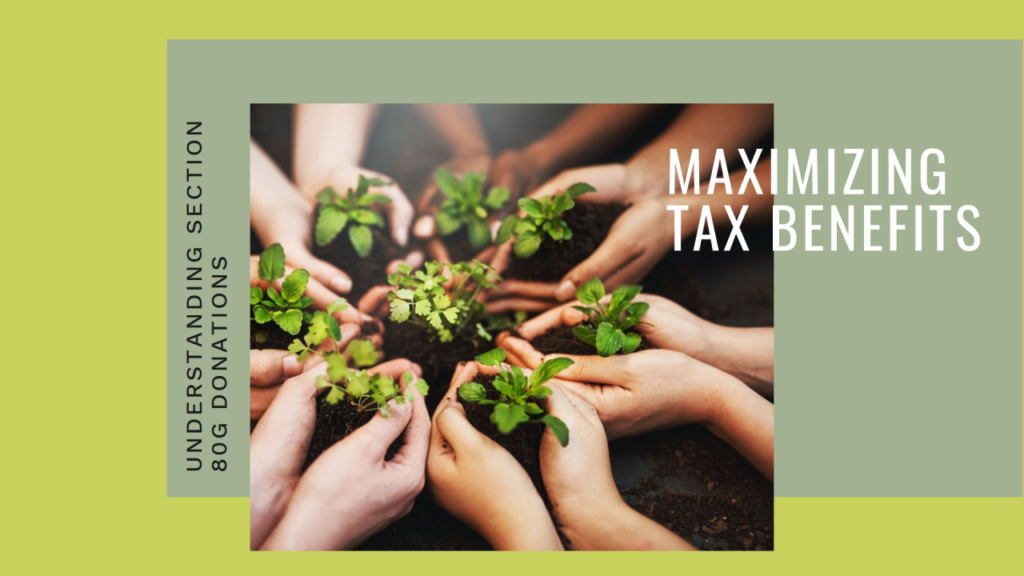Introduction: Many individuals aspire to contribute to charitable causes, and the government incentivizes such philanthropic acts by offering tax deductions under Section 80G of the Indian Income Tax Act. This article delves into the intricacies of Section 80G donations, elucidating its significance and recent updates.
Latest Updates on Section 80G: The recent amendments introduced in Budget 2023 have reshaped the landscape of eligible funds for deductions under Section 80G. Notably, certain funds, including the Jawaharlal Nehru Memorial Fund, Rajiv Gandhi Foundation, and Indira Gandhi Memorial Trust, have been excluded from eligibility for deductions.
Eligibility to Claim Deduction under Section 80G: Individuals, companies, firms, Hindu Undivided Families (HUFs), Non-Resident Indians (NRIs), and other entities are eligible to claim deductions under Section 80G. However, only donations made to prescribed funds qualify for deductions.
Mode of Payment under Section 80G: Taxpayers can claim deductions under Section 80G when they make donations through various modes such as cheque, demand draft, or cash (for donations below Rs 2,000). However, in-kind contributions and cash donations above Rs 2,000 are not eligible for deduction.
Procedure to Claim Deduction under Section 80G: Claiming deductions under Section 80G requires taxpayers to furnish specific details in their income tax returns, including the name, PAN, and address of the donee, along with the amount of contribution. These details must be accurately mentioned in the respective tables provided in the ITR.
List of Donations Eligible for Deduction: Section 80G provides for deductions ranging from 100% to 50%, without or with restrictions, based on the type of donation. The list encompasses donations to various national funds, educational institutions, and charitable trusts, each with its specified deduction limits.
Understanding Adjusted Gross Total Income: Adjusted gross total income plays a pivotal role in determining eligibility for deductions under Section 80G. It refers to the total income adjusted for deductions under Sections 80C to 80U and exempt income, providing taxpayers with a clearer picture of their tax liabilities.
Frequently Asked Questions (FAQs) on Section 80G Donations:
1. What is Section 80G of the Income Tax Act?
- Section 80G of the Income Tax Act provides for tax deductions on donations made to certain relief funds and charitable institutions, encouraging philanthropy while offering tax benefits to donors.
2. Who is eligible to claim deductions under Section 80G?
- Individuals, companies, firms, Hindu Undivided Families (HUFs), Non-Resident Indians (NRIs), and other entities are eligible to claim deductions under Section 80G, subject to certain conditions.
3. What are the recent updates regarding Section 80G deductions?
- Recent updates include amendments introduced in Budget 2023, which exclude certain funds like the Jawaharlal Nehru Memorial Fund, Rajiv Gandhi Foundation, and Indira Gandhi Memorial Trust from eligibility for deductions under Section 80G.
4. What are the modes of payment accepted for donations under Section 80G?
- Donations under Section 80G can be made through cheque, demand draft, or cash (for donations below Rs 2,000). However, in-kind contributions and cash donations above Rs 2,000 are not eligible for deduction.
5. How can one claim deductions under Section 80G?
- To claim deductions under Section 80G, taxpayers must provide specific details, including the name, PAN, and address of the donee, along with the amount of contribution, in their income tax returns. These details must be accurately mentioned in the respective tables provided in the ITR.
6. What is adjusted gross total income, and why is it important?
- Adjusted gross total income refers to the total income adjusted for deductions under Sections 80C to 80U and exempt income. It is essential in determining eligibility for deductions under Section 80G, providing taxpayers with a clearer understanding of their tax liabilities.
7. What types of donations are eligible for deductions under Section 80G?
- Section 80G provides for deductions ranging from 100% to 50%, without or with restrictions, based on the type of donation. Eligible donations include contributions to national funds, educational institutions, charitable trusts, and specific relief funds, each with its specified deduction limits.
8. Can donations made in cash qualify for deductions under Section 80G?
- Yes, donations made in cash below Rs 2,000 are eligible for deductions under Section 80G. However, cash donations above Rs 2,000 and in-kind contributions such as food, material, clothes, medicines, etc., do not qualify for deduction.
9. Are there any restrictions on claiming deductions under Section 80G?
- Yes, certain donations may be subject to restrictions, and deductions may be limited to a certain percentage of the adjusted gross total income. Taxpayers must refer to the specific provisions of Section 80G to determine the applicable restrictions.
10. How can individuals maximize tax benefits through Section 80G donations?
- Individuals can maximize tax benefits by making donations to eligible funds and institutions listed under Section 80G, ensuring compliance with the prescribed modes of payment and documentation requirements while filing their income tax returns.
Conclusion: In conclusion, Section 80G serves as a cornerstone for promoting philanthropy while offering taxpayers the opportunity to contribute to societal welfare and avail tax benefits. Understanding the nuances of Section 80G donations empowers individuals to make informed decisions and optimize their tax planning strategies effectively.
This comprehensive guide elucidates the intricacies of Section 80G donations, empowering taxpayers to navigate the realm of charitable contributions and tax deductions seamlessly.
#TaxBenefits #Section80G #CharitableDonations #TaxDeductions #IncomeTax #Philanthropy #FinancialPlanning #TaxSavingTips #cainbhopal #canatasha

